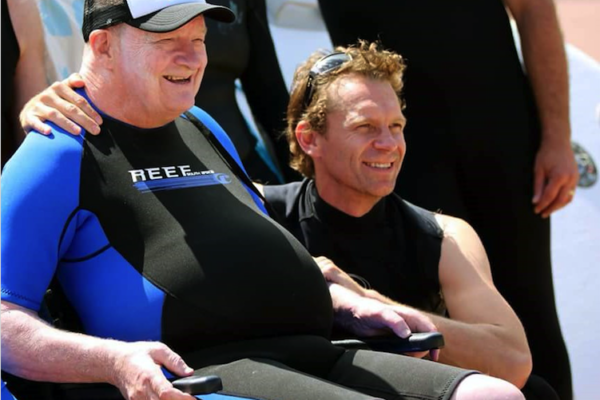
7 ways to parent through your example (Pt 2)
Like it or not, when it comes to parenting, your example overshadows your words.
‘In the final analysis, your child’s character hinges on the traits you exhibit as a parent. And who you are as a parent isn’t left to fate, luck, or chance. You can choose to be the kind of parent you want to be. While plenty of things about your child’s life are unpredictable and beyond your control, you can make certain your child has a parent with particular qualities’. (Dr Les and Leslie Parrot in ‘Becoming the Parent You Want To Be’.)
In my previous post, I mentioned three ways to parent our kids through our example:
1. Walk your talk.
2. See what’s missing in your kids, then work on it in your own life.
3. Ask yourself what you really value.
Now for the final four…
4. Audit yourself.
Dr Les and Leslie Parrot say that every year, they get away for a night, and each identify two character qualities they want to work on for the sake of their marriage and parenting. So for example, one year Les wanted to be more affirming and patient, and Leslie wanted to be more authentic and insightful. Once you have done something similar this is the advice they give…
‘First, once you have clearly stated what two traits you want to embody more, write it down. Think through where you can place the note card listing your two traits. We ended up putting ours on the inside of our vehicles’ sun visors. Second, for each quality, think of a few practical actions you can take to be sure they make their way into your being. After all, it’s one thing to get inspired to be a better parent, it’s quite another to actually become one. Third, from time to time ask your spouse or someone you know well, the big question, ‘How am I doing at being a patient / affirming / authentic / etc parent?
To be honest, Julie and I have only pulled off something similar 3 times since our first child, now 7, arrived. And I don’t need to get away to identify what I am lacking in – patience, sweet patience.
5. Ask yourself how you actually plan on changing.
We might tell our colleagues and relatives to just deal with who we are, but not our kids. They are the ones who confront us with the simple fact that we should be better than we are. And because they are the ones who actually drive us to change, they are also the ones who drive us to the realization that change comes terribly slowly, if at all.
The Parrots have a practical faith in God, because they weave a bit of their faith into their book: ‘Receive rather than achieve your top traits. The qualities you seek to exemplify as a parent are sometimes received more than they are achieved. Without God, in other words, we could never be the parents we want to be.’ Although I know some fantastic atheists, I have found something similar to be true in my own life – my faith gives me a kind of ‘lift’ into aspects of character that I could never have imagined possible. (Just in case I sound saintly, I am lacking ‘lift’ in a whole bunch of areas.)
Whatever it takes to change, the efforts are so worth it. In his book, ‘The Good Enough Child’, Brad Sachs says, ‘Parents who are demanding changes from their children should make some changes themselves – it tends to heighten our sensitivity to how difficult it really is to do something new or different. It also results in family leadership characterized by inspiration and motivation, rather than by criticism and sermons’.
6. Apologize when you fail.
None of us is perfect. And our kids don’t need perfect parents. But neither do they need parents who make excuses for their cowardice, selfishness, temper tantrums, dishonesty and bitterness.
Much much better to say to our kids, ‘Sorry my princess. I should have done better there. I have no excuse. Please don’t copy the way I handled that situation. Please forgive me for where I failed you.’
The Parrots chirp in, ‘No matter how much we love our children, we still make mistakes, misjudge situations, and sometimes lose our tempter. But good parents are humble enough to own up to their mistakes and apologize when necessary.’
We tend to respect people in life who get character right, but also we respect those who, while shooting at higher levels of character, fail and then humbly apologize. Either way – through trying or failing and admitting it – we can inspire our kids.
Our apology also teaches them accountability. As John Grey in ‘Children are from Heaven’ says, ‘When children see their parents apologizing on a regular basis, they gradually learn to be accountable for their own mistakes’.
7. Start today.
Every day situations arise that give you the chance to take the high road or the low road.
While I was writing this post, the doorbell rang, I thought to myself. ‘Flip, it’s someone begging for something! I need to get rid of them as quickly as possible – I am busy here.’ Before I could stop them, Fynn (5) and Ivy (3) gathered around me to see how I would deal with this tattered, smelly lady. Poised to speedily get rid of her, it suddenly dawned on me that this is what my post is all about.
I realized how I deal with Berenice, desperate mother of her ill two-year old Macaela, would plausibly set in motion how my kids will deal with needy people for the rest of their lives – either with apathy or with wise care. Newly motivated by these four little eyes, I went the second mile with Berenice, helping her in whatever way I could, short of giving her money (a personal policy which I explained to Ivy and Fynn after).
I wonder how many opportunities will come your way in the next day to show your kids the way to live? Like it or not, your kids will notice your response to all of them.
Deaf as they may be to your instructions, they don’t miss a thing you do.
Comments
Also published on Medium.



